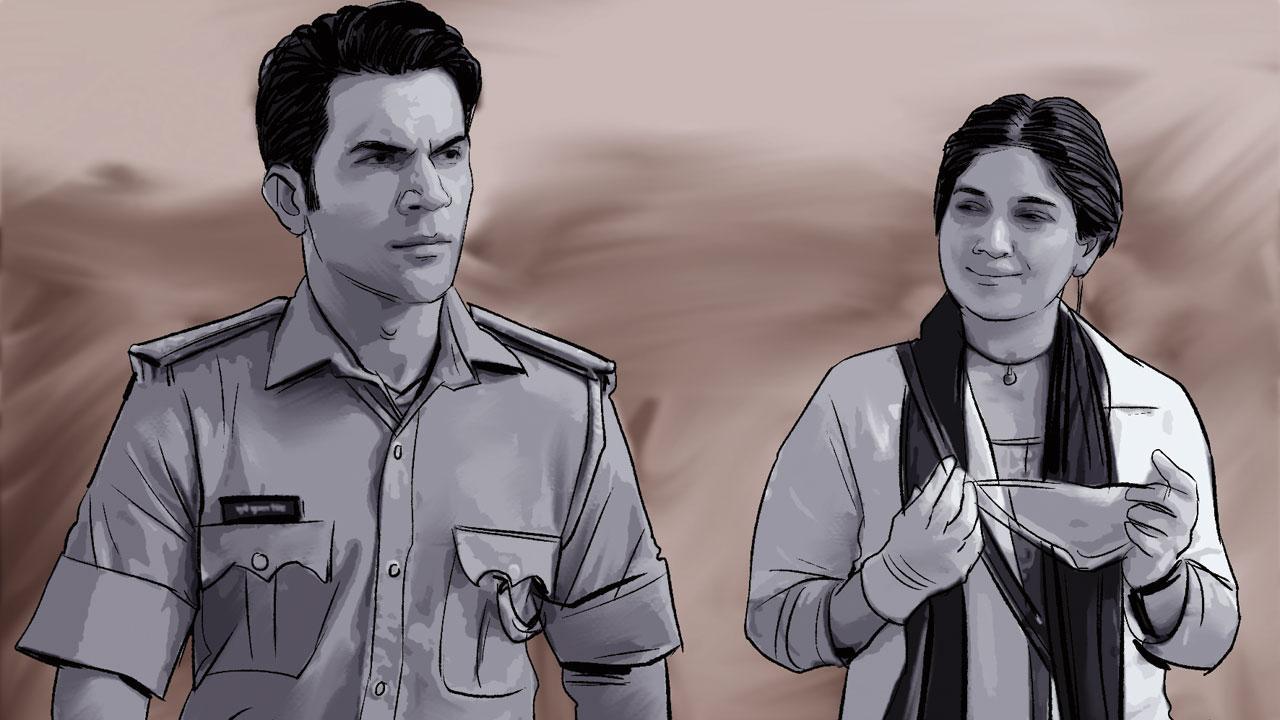Other films on the lockdown include two documentaries, Vinod Kapri’s 1232 km and Mihir Fadnavis’ Lords of Lockdown.

Illustration/Uday Mohite
![]() At the heart of Bheed (The Divided Crowd), directed and produced by Anubhav Sinha, is India’s ‘Long March Home’—one of the most devastating events in India’s recent history, triggered by the sudden announcement of the national lockdown on March 24, 2020, during the Coronavirus pandemic. It left over 1,00,00,000 (one crore) migrants, especially daily wage earners, desperate: having lost their jobs and homes, and with no buses or trains available, they walked home, many over hundreds of kilometres, across India. If they had to die, at least they would die at home, they said. Sinha is one of India’s most courageous and solid filmmakers, who earlier made Mulk (on Islamophobia) and Article 15 (on caste-based violence). He is one of the very few good Hindi mainstream filmmakers left, still speaking truth to power, while most prefer the relatively shallow eddies of romantic, patriotic or crime dramas. Bheed is theatrically released. Other films on the lockdown include two documentaries, Vinod Kapri’s 1232 km and Mihir Fadnavis’ Lords of Lockdown.
At the heart of Bheed (The Divided Crowd), directed and produced by Anubhav Sinha, is India’s ‘Long March Home’—one of the most devastating events in India’s recent history, triggered by the sudden announcement of the national lockdown on March 24, 2020, during the Coronavirus pandemic. It left over 1,00,00,000 (one crore) migrants, especially daily wage earners, desperate: having lost their jobs and homes, and with no buses or trains available, they walked home, many over hundreds of kilometres, across India. If they had to die, at least they would die at home, they said. Sinha is one of India’s most courageous and solid filmmakers, who earlier made Mulk (on Islamophobia) and Article 15 (on caste-based violence). He is one of the very few good Hindi mainstream filmmakers left, still speaking truth to power, while most prefer the relatively shallow eddies of romantic, patriotic or crime dramas. Bheed is theatrically released. Other films on the lockdown include two documentaries, Vinod Kapri’s 1232 km and Mihir Fadnavis’ Lords of Lockdown.
ADVERTISEMENT
Rajkummar Rao plays Surya Kumar Singh Tikas, a Dalit policeman “in-charge” at a checkpost in the fictional town of Tejpur, where hordes of migrants have landed up. His dilemma: he would rather just let the poor migrants go home, but he must follow orders not to let anyone cross the border, to prevent the virus from spreading. With mass migration tackling internal borders, Sinha draws parallels to the Partition, but several references to this, the prime minister and caste, have been mauled by the Censor Board. Despite this, the film is a defiant, scorching mirror that refuses to lie.
The checkpost is a microcosm and a crucible that reveals the conflicting interests between the many castes, classes and faiths that make up the bheed of India. His partner Renu Sharma (Bhumi Pednekar) is an upper caste medical officer, also posted there. Many characters are tropes, standing in for various communities—the upper caste, violent cop (Ashutosh Rana); the Islamophobic watchman (Pankaj Kapur); the rich woman in an SUV (Dia Mirza). Sinha draws from the headlines—the teenage girl who drove her injured dad home over 1,200 km on a bicycle; the migrants hiding in a cement mixer; other migrants sprayed with pesticide—but explores the underlying socio-political issues. Accused of having an upper caste hero save the day in Article 15, here Sinha puts the Dalit hero Tikas, in charge, struggling to follow orders, and ends realistically with an uneasy truce, rather than a Disney victory.
The direction is solid and convincing. The ensemble cast shines; but fewer sub-plots would have allowed the key characters more breathing space. In a moving scene, when senior police officer (Ashutosh Rana) slaps Rajkummar Rao and asks, “Hero banna hai?” (You want to be a hero?), Rao replies, “Humko bhi hero banna hai” (Yes, why not?)—“how long should we wipe the hero’s cars and carry his shoes?” Rao puts in a stand-out performance; Pednekar is a good counterfoil. In another moving scene, when Dia Mirza fires her driver for stopping to rescue the bicycle girl, he tells her, he returned not because he is helpless, but because she is. Power defused by compassion recurs in the climax, when Rao movingly announces, after the police powerplay, that the policemen’s families will cook for the migrants and nobody will go hungry tonight. A few dialogues are on the nose, but that’s minor carping.
The screenplay and dialogues, by Sinha, Saumya Tiwari and Sonali Jain, are enriched by having two women also drive the narrative. The upper caste Renu Sharma not only pursues a relationship with a Dalit, she is also the scientific voice of reason, silencing a politician who insinuates that Muslims spread the virus. The bicycle girl is India’s new Mother India—ever-sacrificing, yet showing the way forward. The screenplay also dares to discuss a police officer’s sexual dysfunction when in bed with his upper caste partner; the rarely-discussed, intimate price of caste.
Cinematographer Soumik Mukherjee is superb in painstakingly creating the film’s black, white and rich grey palette, giving us much-needed distance from the high drama and headlines. Editor Atanu Mukherjee keeps it fairly taut. Sound designer Anita Kushwaha and music composer Anurag Saikia are effective; his Herail Ba is haunting. The women crew include screenwriters Saumya Tiwari and Sonali Jain, sound designer Anita Kushwaha and costume designer Vishakha Kullarwar. Salute, Anubhav Sinha!
Meenakshi Shedde is India and South Asia Delegate to the Berlin International Film Festival, National Award-winning critic, curator to festivals worldwide and journalist.
Reach her at [email protected]
 Subscribe today by clicking the link and stay updated with the latest news!" Click here!
Subscribe today by clicking the link and stay updated with the latest news!" Click here!







